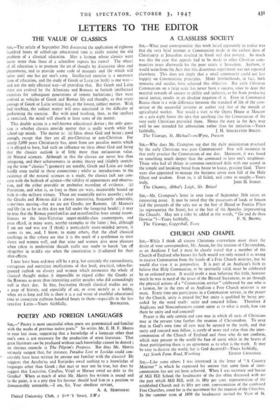LETTERS TO THE EDITOR
THE VALUE OF CLASSICS
Slit,—The article of September 26th discussing the application of eighteen hundred hours of school-age educational time is really raising the old problem of a classical education. May a layman whose classics were never more than those of a schoolboy express his views? The object of all education is to promote the art of thought by discussing ideas and phenomena, and to provide some code of manners and life which will serve until one has got one's c,wn. Intellectual exercise is a necessary item of education, and the study of Greek or Latin (or both) is one way— and not the only effectual way—of providing that. But Greek and Latin were not evolved by the Athenians and Romans to furnish intellectual exercises for subsequent generations of remote barbarians ; they were evolved as vehicles of Greek and Roman life and thought, so that every passage of Greek or Latin writing has, at the lowest, subject matter. With bad teaching, the subject matter will pass unnoticed in the difficulty of performing the exercise. But with good teaching, then, as the intellect is exercised, the mind will absorb at least some of the matter.
This double action is a well-known educational device ; the only ques- tion is whether classics provide matter that is really worth while for school-age minds. The matter is: (a) Ideas about God and being ; good enough, except that they are all pre-Christiau or non-Christian. For nearly 2,000 years Christianity has, apart from any peculiar merits which it is alleged to have, had such an influence on ideas about God and being that the classics outlook is of little more than antiquarian value. (b) Natural sciences. Although in this the classics are never less than intriguing, and their achievements in atomic theory and (slightly stretch- ing the term " classics ") geometry are notable, Greek and Latin are today hardly even useful in those connections ; whilst as introductions to the existence of the natural sciences as a study, the classics lack any con- cern with the bedrock of science—the validity of appearances and observa- tion, and the either provable or probative recording of evidence. (c) Patriotism, and what is, so long as there are wars, inseparably bound up with it—the military virtues. These are essentially native growths ; what the Greeks and Romans did is always interesting, frequently admirable, scmeimes moving—but we are not Greeks, nor Romans. (d) Manners and life (in so far as this does not fall under the foregoing heads) ; it may be true that the Roman paterfamilias and materfamilias bore strong resem- blances to the later-Victorian upper-middle-class counterparts, and even afford, in many ways, worthy examples to the latter ; but, although I am not and was not (I think) a particularly nasty-minded person, it seems to me, and, I know, to many others,. that the chief classical teachings in this sphere are that it is the mark of a gentleman to treat slaves and women well, and that wine and women give most pleasure when taken in moderation though really one ought to knock 'em off altogether in middle age when the constitution is ill-adapted for their after-effects.
I may have been and may still be a prig, but certainly the extraordinary, outrageous and outraging implications of that level, practical, taken-for- granted outlook on slavery and women which permeates the whole of classical thought makes it impossible to regard either the Greeks or the Romans as more than interesting earlier peoples who did astoundingly well in their day. In fine, fascinating though classical studies are as a page of history, and especially of art, or even merely as a hobby, when art is long and life is short ft is a sad waste of youthful educational time to consecrate eighteen hundred hours to them—especially to the less


































 Previous page
Previous page